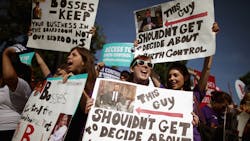US Birth Control Ruling Fuels Battle over Corporate Rights
WASHINGTON - The U.S. Supreme Court has opened up a new front in the battle over corporate rights by ruling that family-owned and other closely held corporations can mount religious objections to government action.
Monday's decision came in a case in which companies sought an exemption to a provision of the 2010 Obamacare healthcare law that requires employers to provide insurance coverage that includes birth control.
The court allowed the exemption and in so doing raises the possibility of religious-based exceptions on issues such as blood transfusions, antidepressants and vaccinations, liberal Justice Ruth Bader Ginsburg warned in her dissenting opinion.
She added that there was nothing in the majority opinion, written by conservative Justice Samuel Alito, that foreclosed the possibility of a publicly traded company making a similar claim.
The majority's logic "extends to corporations of any size, public or private," she said.
Alito said there would be various obstacles to such a company making a claim. He questioned whether a broad array of shareholders would ever agree to run a company under the same religious beliefs. He said it "seems unlikely" that big public companies would ever want to make a religious claim.
The high court ruled 5-4 in lawsuits brought by two family-owned companies, Hobby Lobby Stores Ltd. and Conestoga Wood Specialties Corp. It concluded for the first time that such closely held corporations could make religious-based objections under a 1993 law called the Religious Freedom Restoration Act (RFRA).
Some lawyers critical of the decision said it paved the way for business owners to discriminate against certain employees, including gays and lesbians. Others said corporations could seek exemptions from environmental regulations.
The court's majority and lawyers representing the companies involved in Monday's case insisted the ruling is narrow.
Who ends up being correct about the scope of the ruling will become clearer when lower courts test the limits of the decision in future cases.
Corporations as People
Four years ago, again on a 5-4 vote, the court endorsed corporate rights in another context: campaign finance. The ruling in Citizens United v. Federal Election Commission cleared the way for increased corporate and union spending during federal elections.
It drew sharp criticism from the left, including from President Barack Obama who, with Supreme Court justices in attendance at his 2010 State of the Union address, accused them of opening the floodgates for special interests to spend without limit on U.S. elections.
At the time Alito, most notably among the justices present at the speech, shook his head and mouthed the words, "Not true."
Emphasizing a partisan split on how the law should treat corporations, Mitt Romney, Obama's Republican opponent in the 2012 presidential election, memorably told a protester on the campaign trail that "corporations are people, my friend."
The idea that corporations have some of the same rights as people is not new in U.S. jurisprudence, but Monday's ruling and the Citizens United case have both expanded on it in new areas of the law. Seizing upon the rhetorical links between the cases, Ginsburg on Monday cited then-Justice John Paul Stevens' lengthy dissenting opinion in Citizens United, in which he said corporations "have no consciences, no beliefs, no feelings, no thoughts, no desires."
When judged alongside Citizens United, Monday's ruling provided further ammunition to liberal activists who claim the Supreme Court majority is too pro-business at the expense of workers.
"The court's conservative majority will bend over backwards to find that corporations can make every claim that individuals can bring," said Doug Kendall, executive director of the Constitutional Accountability Center, a liberal group critical of what it describes as the court's pro-business bias.
Others disagreed that Monday's ruling was such a major development. The court's conclusion that the word "person" in the religious freedom law applies to closely held corporations was a reasonable one, said Ilya Shapiro, a legal scholar at the libertarian Cato Institute. "This was a technical, statutory ruling," he said.
When analyzing religious objection, courts are required under the religious freedom law to determine whether the government regulation unduly burdens the company's owners, and, if so, whether it furthers a compelling government interest and whether the regulation is the least restrictive way of achieving that goal.
Alito said the ruling dealt specifically with the birth control provision, noting that in other cases, like immunization, the government was likely to be able to show that it had a compelling interest and that there was no less restrictive means for it to achieve its goal.
In Monday's ruling, the court indicated that regulations that already allow for exemptions, as the birth control mandate does for religious institutions, might be especially vulnerable.
Alito addressed Ginsburg's concerns about potential future cases in his majority opinion. He said it did not give corporations carte blanche to object to an array of government action, including bans on employment discrimination.
Ginsburg was not persuaded. The court's "expansive notion of corporate personhood ... invites for-profit entities to seek religion-based exemptions from regulations they deem offensive to their faith," she wrote.
(Reporting by Lawrence Hurley; Editing by Howard Goller and Peter Henderson)
Copyright Reuters, 2014
